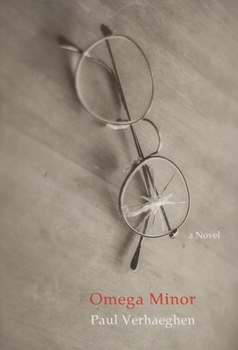Omega Minor
Select Format
Select Condition 
Book Overview
Berlin, Spring of 1995. While a group of neo-Nazis are preparing an anniversary bash of disastrous proportions, an old physics professor returns to Potsdam to atone for his sins, an Italian postdoc designs an experiment that will determine the fate of the universe, and, in a room at Le Charit?, a Holocaust survivor tells his tale to the willing ear of a young psychologist. Who is that talking cat, why do ghosts of SS soldiers roam the city, and what is Speer's favorite actress up to?
Format:Paperback
Language:English
ISBN:1564784770
ISBN13:9781564784773
Release Date:November 2007
Publisher:Dalkey Archive Press
Length:691 Pages
Weight:2.34 lbs.
Dimensions:2.0" x 6.0" x 9.0"
Grade Range:Postsecondary and higher
Customer Reviews
2 ratings
Deserves the National Book Award/ Nobel/ etc.
Published by Thriftbooks.com User , 17 years ago
I can't believe there are only two reviews for this brilliant, all-encompassing masterpiece! Instead of talking about the stories, themes and plots of this beautiful work I'll only say - not unlike Catch-22, Lolita, The Savage Detectives or any important work - anyone with an appreciation of literature MUST read this.
A mighty axe taken to our experience of history
Published by Thriftbooks.com User , 17 years ago
Fans of the supermassive black hole known as the postmodern novel could easily overlook this quiet English debut by a Flemish author, as I nearly did. That would be a shame, because it makes a major contribution to the genre. The sheer scale of its ambition makes it hard to describe, but here goes: both the subject and the object of the novel - both its content and its narrative experience - is the fracturing of the Western psyche in the twin events of the Holocaust and the atomic bomb. The subjective, compromised historical accounts in the novel continuously thwart the reader's need to moralize and synthesize. One of the narrative threads audaciously deconstructs the "sanctified literary genre" of the Holocaust memoir, arguing that its cool, objective testimony, the "Style," grants the reader an undeserved identification with the victim and a false moral distance. The survivor De Beer's tale is told to Verhaeghen's own narrative proxy, the psychology student "Paul," and their tempestuous author-reader relationship elevates awareness of our own participation in smug historical distancing. The thematic device that ties together the plot threads is the concept of dark matter, signified in Einstein's equations by the Omega symbol. Competing theories of dark matter's make-up, either as Massive Astrophysical Compact Halo Objects (MACHOs) or Weakly Interacting Massive Particles (WIMPs) provide an elegant metaphor for history: we are continually pulled into the orbit of big ideas, but we are ultimately alone on the journey and trapped by our own subjectivity. Veraeghen's physics-history amalgamation raises obvious comparisons to Pynchon, a debt that the novel pays in a sly tribute: in one scene a woman dances to a ramshackle band "as if Benny Goodman were playing and not some poor man's orchestra led by Pig Bodine" - a reference to Pynchon's recurring character. But Verhaeghen's creation is unique, a totalizing experience of the last century's worst moments and of our own sad efforts to make sense of them. At one point De Beer suggests that a story can be "an axe to decapitate any happiness that is too-good-to-be-true," and what higher purpose can a novel serve than to take that axe to history?





